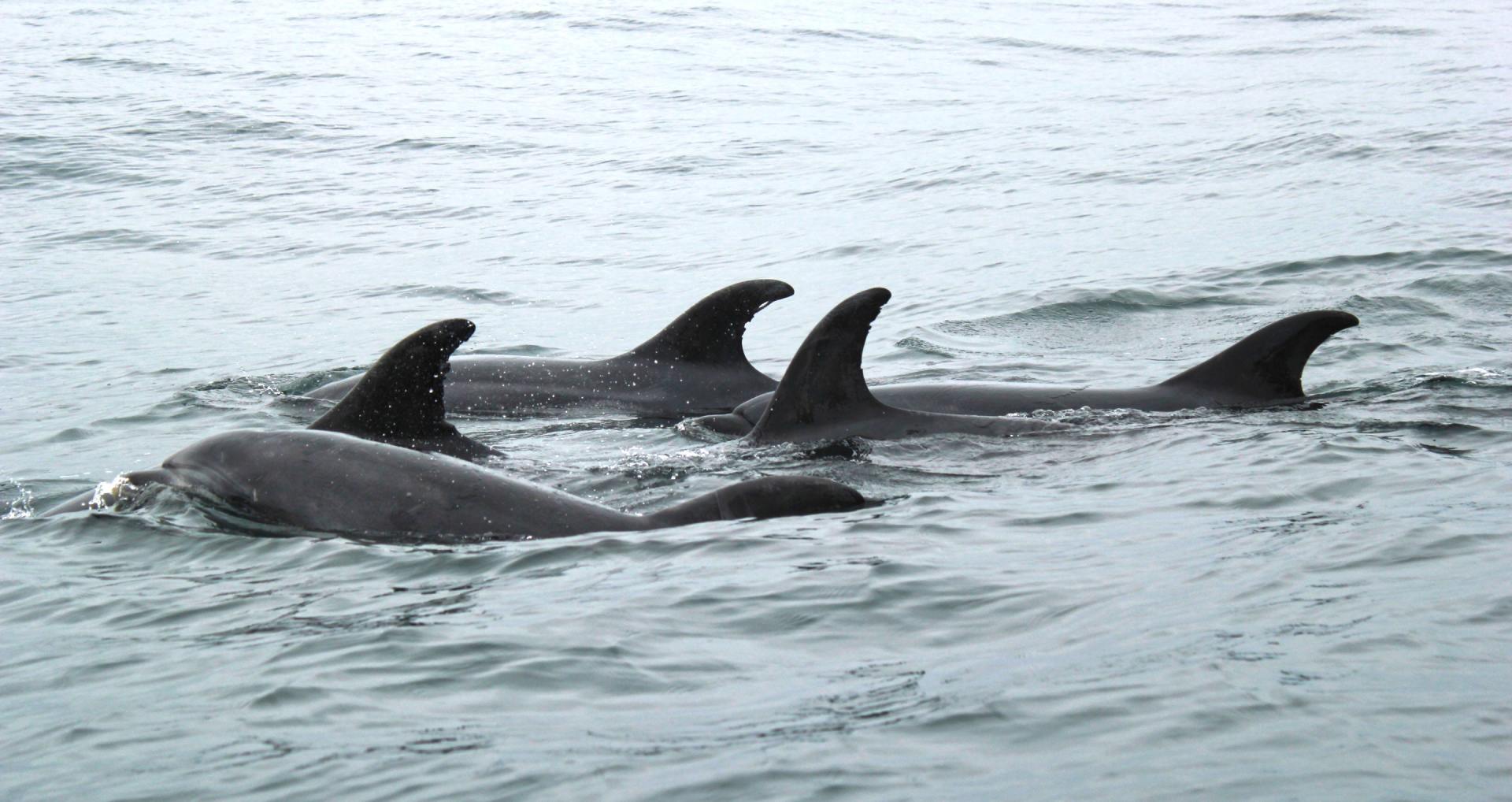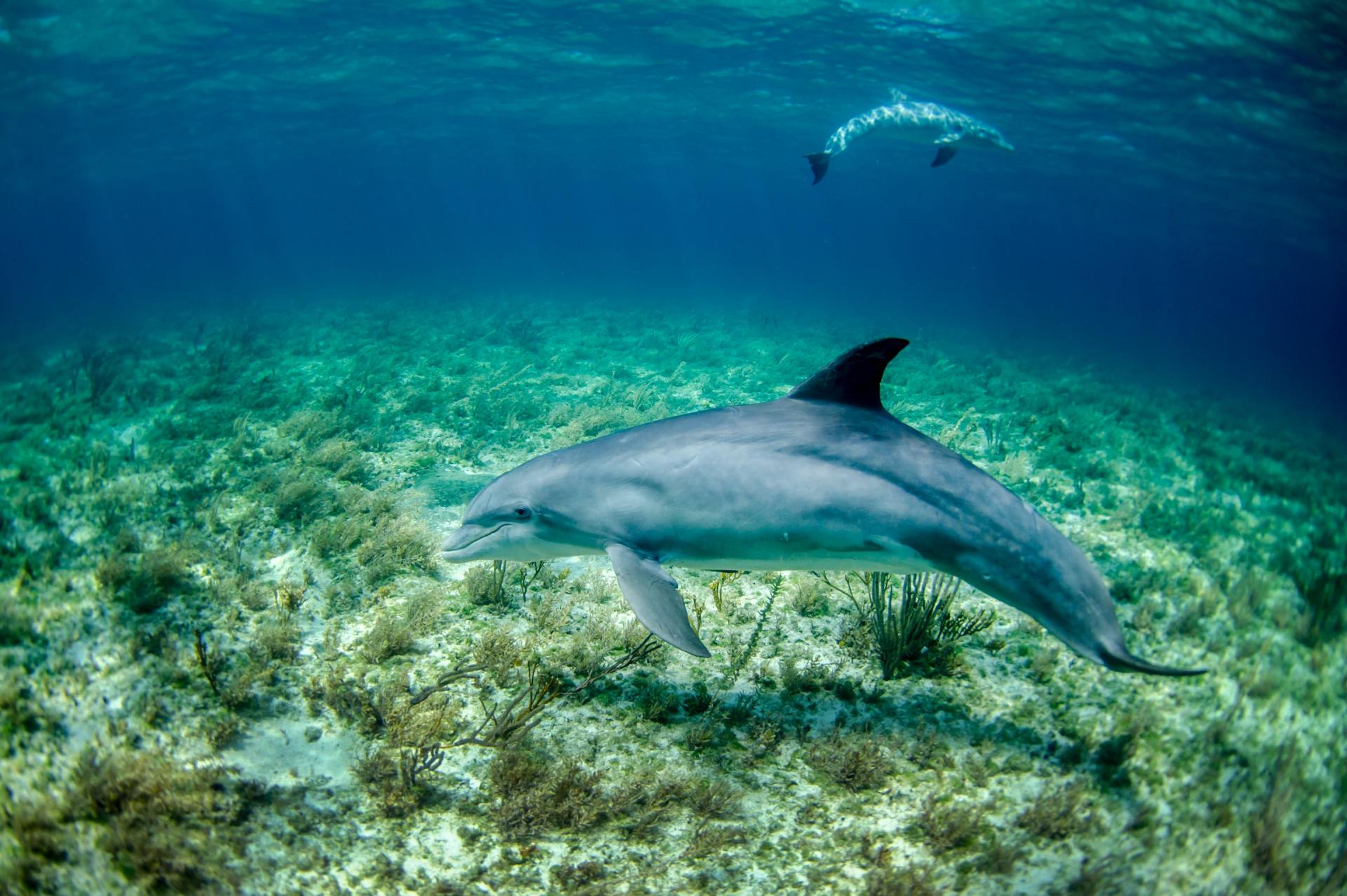Introvert or Extravert? A Dolphins Personality Can Be Either, Just like Humans!
For the first time, a new study has revealed that some wild dolphins are introverts, while others are extraverts, which are personality traits that can influence their survival. Research into animal personalities has been a "hot-topic" in zoological studies and has been on-going over the past few decades, particularly involving animals with higher order intelligence such as primates, but also in songbirds, fish, reptiles and even insects. One conclusion seen across the animal kingdom is that shy and bold individuals exist within every population.
Bottlenose dolphin pod travelling in close association. Source: Isabel Retamales
Ornithologists, such as Professor John. L. Quinn from University College Cork (UCC), have been studying personality traits in wild songbirds for a number of years, and have pondered some interesting questions about how innovative individuals within a population are influenced by genetics and environmental factors or how personality can influence a birds decision making in regards to dispersal within a habitat - ultimately possibly effecting survival and thus, evolution. Other scientists such as Alecia J. Carter, analysed personality traits in male wild lizards, while others such as Noa Pinter-Wollman studied personality in social insect colonies and how worker personality effects overall colony personality.
Now researcher Bruno Díaz López has examined personality and social structure in wild Bottlenose dolphins ( Tursiops truncatus
) in a new study published in Animal Behaviour.
Bottlenose dolphins are well known as intelligent and charismatic marine megafauna. They surface often to breathe, two or three times a minute and travel in social groups that have highly complex social structure known as "fission- fusion" society, where Individuals come and go. The average group size of a bottlenose dolphin pod is four individuals, but some groups may be as large as 30.
Bottlenose dolphins communicate with each other by a complex system of squeaks, barks, chirps and whistles. They have been known to come to the aid of an injured group member and help it to the surface and find food. Bottlenose dolphins track their prey through the expert use of echolocation, similar to bats. They can make up to 1,000 clicking noises per second. These sounds travel underwater until they encounter objects, then bounce back to their dolphin senders, revealing the location, size, and shape of their target.
Underwater shot of bottlenose dolphins. Source: NOAA
When dolphins are feeding, that target is often a bottom-dwelling fish, though they also eat shrimp and squid. These clever marine mammals are also sometimes spotted following fishing boats in hopes of dining on leftovers.
Their curious nature and the fact that they often seek out human activity such as vessels, fish farms and eco-tourism, gave Bruno Diaz Lopez a great opportunity to study the personalities of bottlenose dolphins in the Gulf of Aranci, Italy. Using photo identification, he identified 24 adult individuals—13 females and 11 males —that had been observed frequently. He then, similar to other studies, compared an animal’s shyness or boldness in response to novel, risky, or challenging situations. An extraverted or "bold" animal for instance, was more likely to approach a novel object or investigate a potential predator than is one that is shy. Between 2004 and 2011, Díaz López then filmed the reaction of these 24 dolphins to two new threats, such as the presence of a person in snorkeling gear and the sound of an underwater alarm or acoustic deterrent, designed to deter dolphins from fishing nets. Results of measuring the dolphins distance to the novel stimulus revealed that some individuals were consistently bold, i.e. they would closely approach both a strange device emitting an alarming sound and a strange person, while some dolphins were consistently shy, and stayed approximately 220 feet away on average, and others that were consistently intermediate in their reactions—sometimes approaching, sometimes avoiding the stimulus, "testing the water" so to speak.
The author also observed which of the other dolphins his study subjects spent time with, and from these relationships, he built a model of their social networks. These results showed that these social bonds or associations varied according to personality type. Bold dolphins showed deeper social connections, such as a stronger preference for spending time with certain individuals (although not necessarily with other bold dolphins) than the shy animals. Female and male dolphins were equally bold or shy.Similar to previous studies on animals personalities, differences in social behaviour based on the personality of individuals could affect a dolphins’ reproductive success, for instance - by building cooperative alliances—particularly among males in other groups.As bold dolphins spend most of their time with other dolphins, these animals, may play a significant role in keeping their groups intact.
© Ocean Research & Conservation Ireland (ORCireland) and www.orcireland.ie , est. 2017. If you like our blogs on the latest news in marine science and would like to support our work, visit www.orcireland.ie to become a member, to volunteer or to make a donation today. This article has been composed based on credible sources.
References
:
Carter, A. J.Heinsohn, R., Goldizen, A.W., Biro, P.A., (2012. Boldness, trappability and sampling bias in wild lizards, Animal Behaviour
, Volume 83, Issue 4, 2012, Pages 1051-1058.
Díaz López, B., (2020). When personality matters: personality and social structure in wild bottlenose dolphins, Tursiops truncatus.
Animal Behaviour
, Volume 163, Pages 73-84
Pinter-Wollman, N., (2012). Personality in social insects: How does worker personality determine colony personality?, Current Zoology
, Volume 58, Issue 4, Pages 580–588, https://doi.org/10.1093/czoolo/58.4.580
Quinn, J.L., Cole, E.F., Reed, T.E., Morand- Ferron, J., (2016). Environmental and genetic determinants of innovativeness in a natural population of birds. Philosophical Transactions of the Royal Society B . Volume 371 Issue 1690. http://doi.org /10.1098/rstb.2015.018
Quinn, J.L. , Cole, E.F., Patrick, S. and Sheldon, B.C. (2011) Scale and state dependence of the relationship between personality and dispersal in a great tit population. Journal of Animal Ecology 80:918-928 .
SHARE THIS ARTICLE















